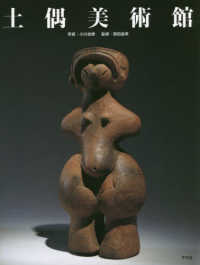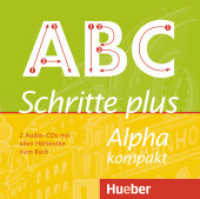- ホーム
- > 洋書
- > 英文書
- > Performing Arts
Full Description
First full-scale thematic analysis of Pina Bausch's Tanztheater, critically evaluating the impact of modernist theatre on her choreographic method
This book presents a new reading of Pina Bausch's dance theatre, orienting it within an international legacy of performance practice. The discussion considers not only the influence of German and American modern dance on Bausch's work but, crucially, interrogates parallels with modernist and postdramatic theatre (including Antonin Artaud, Samuel Beckett, Jerzy Grotowski, and Robert Wilson), the influence of which has been largely neglected in existing studies of her oeuvre.
Pina Bausch's Dance Theatre provides a wide-ranging study of Bausch's aesthetic and methods of practice, with case studies ranging from the beginning of her career to her final choreographies.
Key Features
The first full-scale study interrogating the relationship between Bausch's Tanztheater and modernist theatre practice, structured around a chronological framework of case study choreographiesA new theorisation of the development of Bausch's oeuvre, locating her approach in a broader context of intercultural artistic exchange in the post-WWII periodDraws on literary and theatre theory to form an interdisciplinary methodology for understanding and interrogating Bausch's oeuvreBased on extensive archival research and a specialised knowledge of the evolution of modern dance
Contents
List of illustrations
List of choreographies
Acknowledgements
Introduction
1 A Bilingual Dancer
Defining Dance Theatre
Learning a New Language: Bausch in the USA
Homecoming
Transnational Modernism: Orpheus und Eurydike
'It's not a metaphor. It is what it is': Le Sacre du printemps
2 New Beginnings: The Origins of Bausch's Tanztheater
Early Controversies: The Brecht/Weill Evening
Working from the Inside Out
The Haunted Self: Blaubart
A Theatre of Fragments: The Macbeth Project
3 Unmasked, Unfinished, Unresolved: A Dance Theatre of the Absurd
'An Archaeology of the Everyday'
Returning the Gaze: Kontakthof
'And then, Pina said...': Walzer
4 Violent Acts: Traversing the Postwar Landscape
Performing Authoritarianism: Nelken
Addressing the Past: Auf dem Gebirge hat man ein Geschrei gehört
Engendering Trouble: Two Cigarettes in the Dark
5 Transient Tanztheater: The Co-Production Model
Excavating the Eternal City: Viktor
Circumventing Orientalism? The Co-Production Model
Finding a Universal Language: Masurca Fogo
'Dance is the only true language': Água
6 'I only tried to speak about us'
Ein Stück von Pina Bausch? Passing on the Work
Ageing Gracefully
Turning Back to Dance: Vollmond
On Not Forgetting: 'Sweet Mambo'
Bibliography
Index

![ハグ キス ハグ[comic tint] 分冊版(7)](../images/goods/ar2/web/eimgdata/EK-1479634.jpg)






